Date: December 7, 2024
Venue: Online
On December 7, 2024 BhāratShakti team organised a webinar on the theme – Sri Aurobindo, the Seer-Poet. The programme included three talks and interaction with the participants. The speakers included Shri Pradeep Narang, Dr. Shaurya Brahmbhatt and Dr. Larry Seidlitz.
The webinar was moderated by Dr. Beloo Mehra. More than 35 people joined online for the programme which lasted for about 2.5 hours. The webinar was also livestreamed at Sri Arvind Sadhana Kendra at Vallabh Vidyanagar, Gujarat where about 15 more people joined the programme.
Since September of 2024, BhāratShakti team has been exploring a vast topic “The Spirit and Forms of Indian Art” through the online journal Renaissance. Every month a specific aspect of this theme is explored in some depth. This webinar was conceived as part of this ongoing research and study.
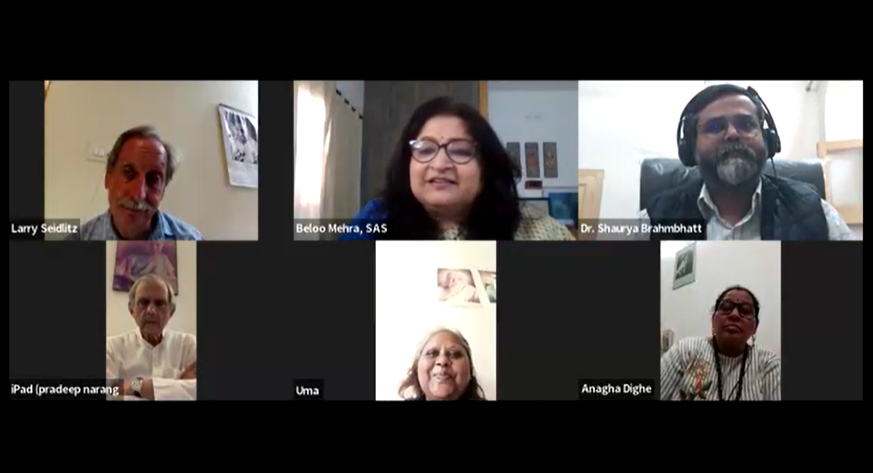
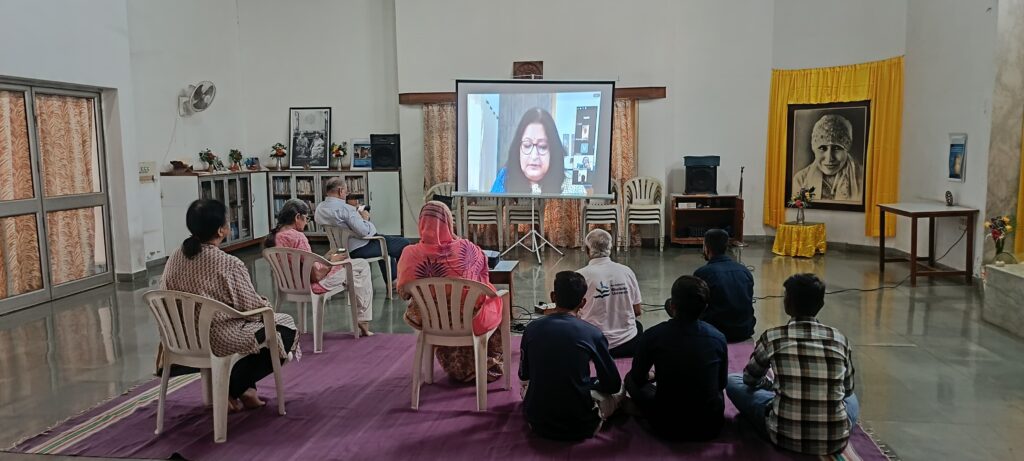
Dr. Beloo Mehra, Director, BhāratShakti, and Editor, Renaissance, welcomed the speakers and the participants. In her opening remarks, she mentioned that for the months of November and December, through a double issue of Renaissance, two related topics are being explored – The Way of the Indian Artist and Art as Yoga.
In connection with that it made perfect sense to devote some focused time to meditate on Sri Aurobindo’s poetic work, his yogic artistry, and deepen our shared understanding of how in India all artistic and creative pursuit, indeed all knowledge traditions themselves, are essentially and intimately connected with the discipline of yoga – a going within and a seeing within.
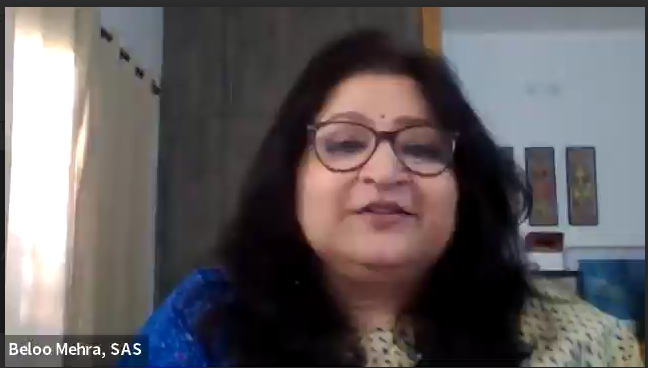
Sri Pradeep Narang, Chairman, Sri Aurobindo Society, whom we all affectionately call “Pradeep Bhai” was invited first to speak about his love for the poetry of Sri Aurobindo. He informed the listeners about a recent project that was executed by Sri Aurobindo Society by bringing out an audio book containing selected poems of Sri Aurobindo which are beautifully recited by the famed actor Victor Banerjee.
Thereafter, Pradeep Bhai chose to recite 6 short poems which were his favourites. Shiva, Godhead, Nirvana, The Divine Worker, Is This The End and Krishna. About Nirvana, he explained that it describes the experience Sri Aurobindo had after going into meditation as per the instructions of the Yogi Lele.
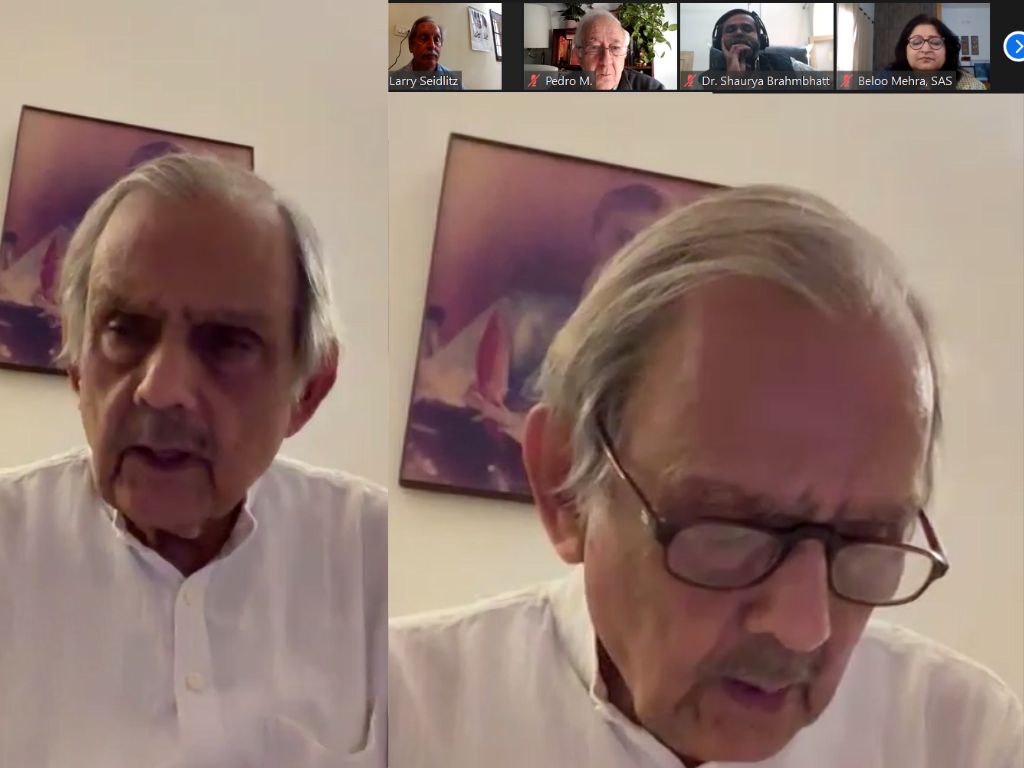
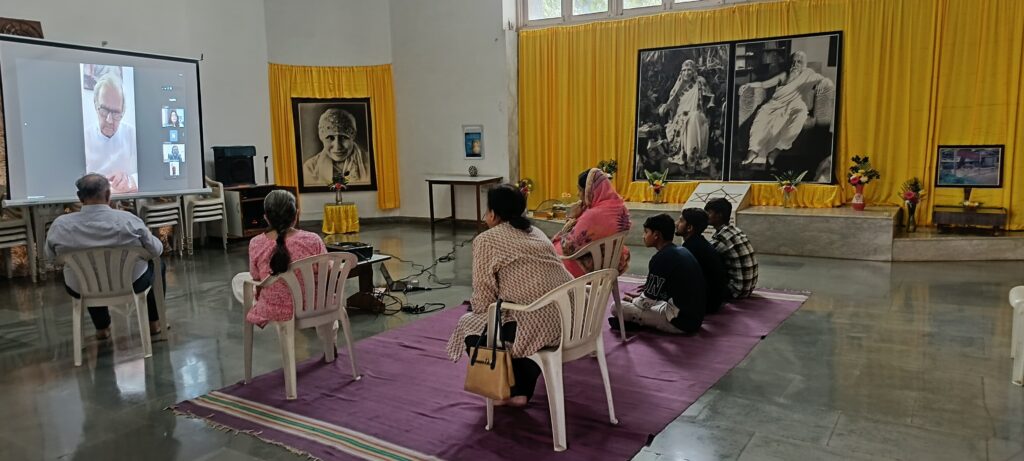
He also read out some lines from the poem The Dwarf Napoleon which is simultaneously a remarkable psychological analysis of Hitler. Written in 1939, it is also a prophetic poem which actually predicted the death of Hitler. The accuracy of the prediction about Hitler was absolutely amazing, Shri Narang added.
The next speaker, Dr. Shaurya Brahmbhatt from MSU, Baroda, spoke about how poets generally receive inspiration but most of them are unable to translate that into their poetical expression to the full extent of their vision unlike great Seer-poets like Sri Aurobindo who continuously dwell in the higher realms of Truth.

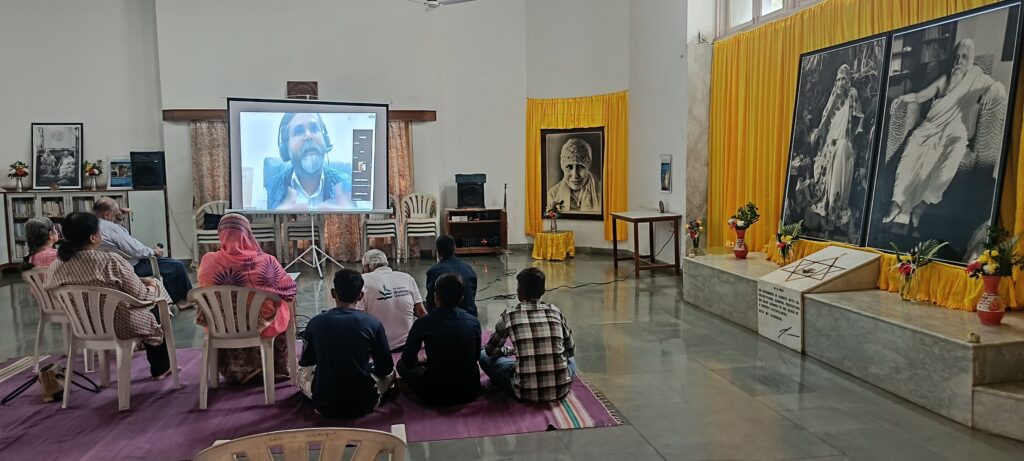
The first quality the great poets have is the mastery over the language, he emphasised. The second aspect is the vision that the poet sees. In this respect, Sri Aurobindo is both a poet and a prophet because he always brings something down from the higher plane in his poetry – not just something that belongs to thought or emotions. That is why we consider him a seer-poet. Thereafter, Dr. Brahmbhatt recited the poem Musa Spiritus.
The final speaker, Dr. Larry Seidlitz from Savitri Bhavan, Auroville, started by saying that though Sri Aurobindo’s poetry displayed a mastery of the language and extraordinary poetic skill, he would be focusing more on Inspiration and Intuition as a source of higher knowledge which is so evident in all of Sri Aurobindo’s writings. In this way, his presentation built upon the points made by the previous speaker.

Taking one of his poetic creations as an example, Dr. Siedlitz explained that Inspiration can come from any of the higher planes of the mind as mapped by Sri Aurobindo like the Higher Mind, Illumined Mind, Intuitive Mind etc. But besides the higher planes of the mind there were also the inner planes of being reaching up to the Psychic being.
He read a few lines about Inspiration from Savitri which contains much of the Overmind influence in its Mantric verses. He also shared several insights from Sri Aurobindo’s writings on Intuition, Discrimination and Equality. He concluded his presentation by citing some conversations with the Mother about the development of Intuition and Inspiration.
After each speaker, there were some interesting questions by the participants. Some of the questions were dealt with in greater detail at the end of all the talks. Overall the programme was highly appreciated by all the participants.
About the Guest Speakers:
Dr. Larry Seidlitz, formerly a research psychologist in the USA, is a devotee and scholar of Sri Aurobindo’s and the Mother’s Integral Yoga living near Pondicherry. He has authored three books and numerous articles on the Yoga, edits books and articles for other scholars on the Yoga. He was the editor of the American journal Collaboration from 2004 to 2020, and since 2022 edits the journal Invocation, published by Savitri Bhavan in Auroville.
Dr. Seidlitz currently leads the Sunday Savitri Study Circle at Savitri Bhavan and gives talks on related topics. From 2004 until June 2024 he was a scholar and instructor at the Sri Aurobindo Centre for Advanced Research in Pondicherry. He occasionally guides students from other universities and participates in seminars and conferences on the Integral Yoga.
Dr. Shaurya Brahmbhatt is Assistant Professor in the Department of English, The Maharaja Sayajirao University of Baroda. He has the privilege and blessing to be part of the same Faculty of Arts which was the erstwhile Baroda College where Sri Aurobindo taught English and French for many years.
Dr. Brahmbhatt also serves as the Coordinator for the university’s Centre for Sri Aurobindo Studies and Centre for Theological Studies. With deep interest in Sri Aurobindo’s poetry, poetics and especially Savitri, Dr. Brahmbhatt is currently researching on the topic – ‘Poets of Sri Aurobindonian School of thought: Evaluating the construct and relevance of future poetry with special reference to the works of K D Sethna, Pujalal and Sundaram.’
